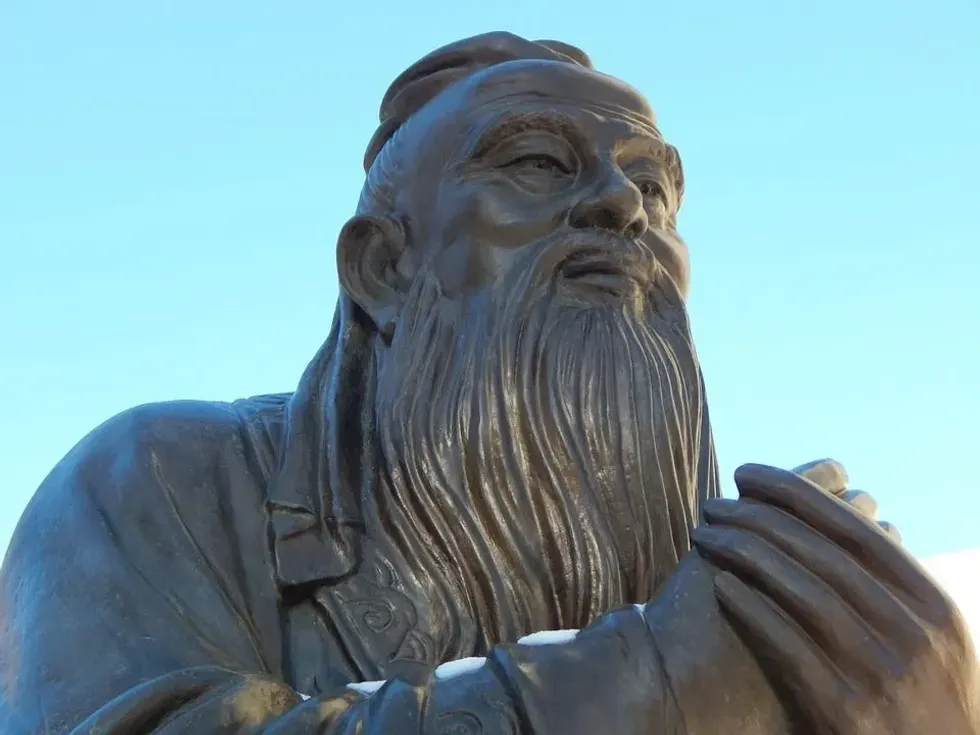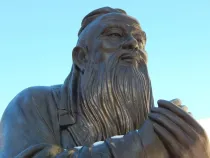51 Curious Confucianism Facts That Explain Ancient Chinese Philosophy

One of the most well-known Chinese philosophies, Confucianism, was developed and propagated by Confucius, a philosopher and poet.
From the sixth to fifth century BCE, Confucianism was preached to reverse the moral decline that became prevalent in society with the gradual waning of the Han dynasty. This moral decline triggered Confucius to bring back the ethical concepts prevalent during the era of the Shang and Zhou dynasties.
The fundamental belief of Confucianism relied on having good character. Confucius established the main ethical principles that one must abide by to have a good life and create a better world.
These principles significantly shaped and influenced Chinese culture and brought about a moral awakening in ancient China. Besides being virtuous, Confucius underlined how important it was to remain devotional to one's family. For these reasons, Confucianism remained actively practiced for over 2,000 years.
New Confucianism has become a form of philosophy to be preached and followed in modern times. Several followers of classical Confucianism also exist. All in all, Confucianists make up for 0.09% of the world population, which is about 6.1 million in number.
What is Confucianism?
An integral part of ancient Chinese history, Confucianism is an ethical and social philosophy or religion that is often referred to as being a way of life. Continue reading to learn some basic facts about Confucian teachings!
- The Confucian philosophy originated and was propagated in the sixth to fifth century BCE. This school of thought, which greatly influenced Chinese society, was formulated by Confucius, a politician, poet, and philosopher.
- Belonging to ancient China, Confucian values were highly spread throughout East Asia, forming the foundation of East Asian culture. Even now, Chinese society, along with East Asian society, is influenced by this form of ethical philosophy.
- While some people might view Confucianism as a religion, a different school of thought upholds the teachings of Confucius as a philosophy or simply a way of life.
- Confucianism heavily relies on virtues and social values, but it was also a way for Confucius to revive the religious traditions of the past.
- Another point of irony in this philosophy is while there are no Confucian Gods, there are Confucian temples. Such temples are the site of certain rituals of Confucianism. Confucian himself is viewed and worshiped in the form of a spirit instead of being seen as an all-powerful God.
- Overall, Confucianism philosophy highlights the importance of having moral excellence and good character. Confucius also highlighted the value of family and the need for devotion to family.
- Interestingly, even though the name Confucianism comes from Confucius, he was not the first person in Chinese history to bring forth such concepts. More appropriately, Confucius was more dedicated to preserving and maintaining the thoughts and knowledge already present in the Chinese culture.
- During the rule of the Song dynasty, Neo Confucianism became more prevalent. This form of Confucianism had influences of both Taoism and Buddhism, in addition to Confucianism. This school of thought included historians, philosophers, social ethicists, poets, political theorists, and government civil servants. The dominance of Neo Confucian values was highly noticeable in the civil service till the abandonment of that whole system in 1905.
- Neo Confucian values were primarily developed by Zhu Xi, a scholar, and a government official. It is often said that Zhu Xi and his philosophy helped shape the course of Chinese history and modified the Chinese worldview forever.
- During the Qing dynasty's rule, which lasted from 1644-1912 AD, there was a noticeable old-school Confucian revival. The rulers of this dynasty accepted Confucianism as their official religion.
- The 'New Culture Movement' that began in the '10s was heavily critical of Confucius and his school of thought. They blamed Confucianism for the backwardness of Chinese society. Nevertheless, Confucianism was prominently present in ancient China for thousands of years and became an integral part of the daily life of people. Even now, the social codes in modern China, along with Korea and Japan, are greatly influenced by the philosophy of Confucius.
Origin Of Confucianism
The origin of Confucianism took place in ancient China. Subsequently, this school of thought evolved under the different Chinese dynasties and helped shape Chinese society and history. So, to understand Confucius and his philosophy, it is essential to read about the origin and evolution of Confucianism.
- Confucius was a Chinese politician, poet, and philosopher born in 551 BCE in the Shandong province of China. He belonged to the famous 'Spring and Autumn Period' in Chinese history, which took place during the latter half of the Zhou dynasty in China. It was Confucius, often considered to be the epitome among the Chinese sages, who created the concept of Confucianism.
- However, Confucius himself insisted that he did not come up with anything new, and he was propagating the cultural codes taken from the Xi, Shang, and Zhou dynasties.
- Confucius was particularly interested in maintaining the unnamed Zhou religion. According to Confucius, the rituals that were part of the Zhou dynasty were ceremonies highlighting the ethics and virtue of the Chinese society.
- Zhougong, the Duke of Zhou, was an inspiration for Confucius. Zhougong helped combine the 'Feudal Ritual System' in China through a series of steps that could be aligned with cultural values and social norms. So, using culture to maintain interstate connections, domestic peace, and the value of social observance to achieve social solidarity all helped the Zhou dynasty remain a relatively peaceful kingdom. Hence, all these factors became a source of inspiration for Confucius.
- Subsequently, with the decline of the Zhou religion and moral order, China descended into an era of spiritual questioning. Furthermore, there was also a decline in moral values. This was when Confucius decided to bring back the moral and ethical values associated with the Shang and Zhou dynasties. Hence, the preaching of Confucianism began and continued from the sixth to fifth century BC.
- One of the main things Confucius did was recodify the classical books belonging to the Shang and Zhou dynasties. These books became known as the 'Spring and Autumn Annals.'
- The Qin dynasty that followed saw a suppression of Confucianism. In fact, during the Qin era, the Emperor ordered 460 Confucian scholars to be buried alive. Nevertheless, despite being suppressed, Confucianism persisted.
- After the end of the Qin dynasty, the Han dynasty brought in the 'Golden Age' in China. Now, Confucianism flourished, and so did Confucian literature and poetry. Emperor Wu Di declared Confucianism to be the official state religion. Confucian ethics were also taught in various newly established Confucian schools. Following the end of the Han dynasty, Confucianism underwent several modifications.
- Confucianism took a back seat during the Sui dynasty, and Taoism and Buddhism became more popular.
- During the Tang dynasty that came next, there was a revival of Confucianism, with the re-introduction of the civil service exam. At the same time, the following dynastic rule of the Song Emperors saw the rise of Neo-Confucianism. Towards the end of the rule of Chinese dynasties, the original Confucianism was revived.
- From 1921 to 1949, there was a rise in New Confucianism. New Confucianism was somewhat similar to Neo Confucian principles and highlighted the importance of political, social, and ecological harmony.
- New Confucianism is a matter of great discussion among Confucian scholars of China and the United States, Taiwan, and Hong Kong.
Sacred Texts Of Confucianism
Several sacred texts belonging to Confucianism form the basis of this philosophy and religion. Let's now take a look at the sacred texts of Confucianism.
- The Five Classics, which Confucius primarily edited, are the foundation of Confucianism. While these books already existed, many scholars believe they were shaped mainly by Confucius, and hence, these texts are associated with him.
- The Five Classics consisted of the Book of History, the Book of Poetry, the Book of Changes, the Book of Rites, and the Spring and Autumn Annals.
- The Book of History encompassed various documents about the Emperors of ancient China. This book, also known as the Book of Documents, further included political speeches and the depiction of a political culture based on trust and morality.
- The Book of Poetry was a collection of classical Chinese songs and poetry. This book highlighted the value of music and poetry to establish harmony in society.
- The Book of Changes, also known as Classic of Change or I Ching, was the earliest classic belonging to Confucianism. This book was comprised of metaphysical elements that combined numerology and art. This book also highlighted the prevalence of the concept of Yin and Yang in the functioning of the universe.
- The Book of Rites was a descriptive text that contained the ceremonies, social norms, and administration during the Zhou era.
- Lastly, the Autumn and Spring Annals consisted of what happened during the 'Autumn and Spring Period.'
- The Book of Changes and Book of Poetry are thought to be nearly 2,200 years old. These are preserved in the Shanghai museum.
- Apart from these Five Classics, a sixth Classic also existed, known as the Book of Music. However, most of this book was destroyed in a fire, and only certain parts of the book could be retrieved.
- In addition to the Five Classics, the Four Books of Confucianism were also an integral part of the sacred texts belonging to this philosophy and religion.
- The Four Books of Confucianism consisted of the Doctrine of the Mean, the Analects, the Mencius, and the Great Learning. These books formed the curriculum for the civil service examinations.
- The Doctrine of Mean was a book with 33 chapters. This book described the way through which one could achieve Confucian virtue.
- The Analects compiled the speeches given by Confucius. It also consisted of the discussions between Confucius and his disciples. The Analects have had the most influence on the development of moral values in China and, subsequently, in the rest of East Asian society.
- Mencius held the conversations that took place between the scholar Mencius and the Kings who ruled during his time. Unlike the Analects, the conversations and dialogues in Mencius were much longer and more elaborate.
- The Book of Great Learning consisted of Chinese philosophy and political themes. This book also had nine chapters written by Confucius' disciple Zeng Zi and the main short text written by Confucius himself.

Philosophy Of Confucianism
The philosophy of Confucianism was mainly formed due to the moral declination that Confucius witnessed in society towards the end of the Zhou era. Therefore, his philosophy promoted the strict adherence to specific codes of ethics and virtues, in addition to certain Gods and spiritual concepts.
Devotion to family played a significant role in Confucianism and was the principal value that those following this philosophy had to abide by.
- The principal philosophy of Confucianism was based on the importance of having good character and virtue, both of which were capable of influencing not only one's life but the whole world.
- Additionally, Confucianism also upheld that humans were inherently good and had the natural inclination to choose what was right instead of committing to something wrong. This statement is quite true, as observed in day-to-day life.
- In Confucianism, moral character was achieved through 'Ren,' or humanity, a core value, which would give rise to even more virtuous traits like humility, respect, and altruism.
- Apart from Ren, the other virtues described in the philosophy of Confucianism are Yi (justice), Zhi (knowledge), Li (proper rite), and Xin (integrity). Together, these formed the Five Constants.
- In addition to the Five Constants, three other virtues were also included Jie (fidelity), Zhong (loyalty), and Xian (filial piety).
- Filial piety, which referred to devotion to family, formed the basis of Confucian values. This devotion could be achieved through several ritual forms like ancestor worship and the use of family metaphors.
- Overall, the family held the highest position among all the groups in Confucian principles and was central to the idea of achieving a strong society.
- Confucius also believed in the idea of Tian, the God of Heaven. This concept has led many people to view Confucianism as a religion. Confucius upheld that to comprehend one's place in the world, and it was necessary to understand Tian and the opposing forces of Yin and Yang at play.
- In Confucian philosophy, one who adhered to all his teachings was elevated to the position of Junzi or Lord's son. Junzi referred to a superior human who could understand the world and their own place in it. Such a person would maintain peace not just with others but with themselves.
- In Confucian philosophy, the self was described as being someone who responds to outer virtues and inner thoughts and reflections.
- The golden rule of Confucianism stated, 'Do good to others as you would like good to be done to you.'
- While most Confucian philosophy is still upheld and highly valued, some parts of the philosophy have become a matter of debate. For instance, the role of women as per Confucianism puts women in a backward position.
- However, in late traditional China, various Chinese rulers introduced some forms of progressiveness in Confucianism. Specific Confucian texts also suggested the establishment of equality between husbands and wives in a marriage.
We Want Your Photos!
More for You
Bachelors in Business Administration

Aashita DhingraBachelors in Business Administration
Based in Lucknow, India, Aashita is a skilled content creator with experience crafting study guides for high school-aged kids. Her education includes a degree in Business Administration from St. Mary's Convent Inter College, which she leverages to bring a unique perspective to her work. Aashita's passion for writing and education is evident in her ability to craft engaging content.
Disclaimer
1) Kidadl is independent and to make our service free to you the reader we are supported by advertising. We hope you love our recommendations for products and services! What we suggest is selected independently by the Kidadl team. If you purchase using the Buy Now button we may earn a small commission. This does not influence our choices. Prices are correct and items are available at the time the article was published but we cannot guarantee that on the time of reading. Please note that Kidadl is a participant in the Amazon Services LLC Associates Program, an affiliate advertising program designed to provide a means for sites to earn advertising fees by advertising and linking to Amazon. We also link to other websites, but are not responsible for their content.
2) At Kidadl, we strive to recommend the very best activities and events. We will always aim to give you accurate information at the date of publication - however, information does change, so it’s important you do your own research, double-check and make the decision that is right for your family. We recognise that not all activities and ideas are appropriate for all children and families or in all circumstances. Our recommended activities are based on age but these are a guide. We recommend that these ideas are used as inspiration, that ideas are undertaken with appropriate adult supervision, and that each adult uses their own discretion and knowledge of their children to consider the safety and suitability. Kidadl cannot accept liability for the execution of these ideas, and parental supervision is advised at all times, as safety is paramount. Anyone using the information provided by Kidadl does so at their own risk and we can not accept liability if things go wrong.
3) Because we are an educational resource, we have quotes and facts about a range of historical and modern figures. We do not endorse the actions of or rhetoric of all the people included in these collections, but we think they are important for growing minds to learn about under the guidance of parents or guardians.







